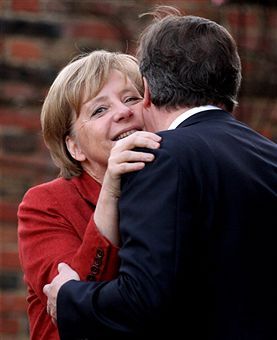 David Cameron made his statement on last week’s EU summit yesterday, answering a
range of questions on the 2011 EU budget increase and future changes to the EU treaties.
David Cameron made his statement on last week’s EU summit yesterday, answering a
range of questions on the 2011 EU budget increase and future changes to the EU treaties.
The Tory backbenchers appeared to be on their best behaviour, but Cameron did make an interesting admission. Asked by Ed Miliband if he would he be repatriating powers, he pointed to a reassurance that the UK’s opt out from economic sanctions remained intact, which was not really in question in the first place, and spoke of “progress on the EU budget”.
It slipped through virtually unnoticed, but this second remark is actually quite worrying. Cameron’s answer suggested that he has agreed to support Merkel’s drive for treaty change in return for 12 other EU leaders signing a letter supporting a 2.9 percent cap on the 2011 EU budget increase and a declaration that future EU budgets should be linked to the state of national public finances. That is a very small price for agreeing a new EU treaty. As we’ve noted before, vague promises for future EU reform have not worked particularly well for the UK in the past (cue: Tony Blair’s £9bn UK rebate give-away in 2005). And in any case, there’s nothing preventing MEPs or other member states agreeing further increases to the EU budget in 2012 and 2013 to make up the difference.
In terms of negotiating intelligently in Europe, Chris Heaton-Harris made the most astute observation during the debate. He noted that the PM now has two separate vetoes at his disposal: one over Treaty change and one over the EU budget post-2013. Heaton-Harris asked the PM whether he would use the twin-vetoes independently to get the maximum reward. This could potentially mean repatriating powers to the UK in return for a new treaty and, secondly, refusing to agree a new EU budget post-2013 unless spending is reduced and better targeted. As we’ve argued here, that would be by far the most strategic approach to negotiations, as he would achieve something big on at least one of them. Alas, Cameron hinted he would pass up the opportunity to use the treaty change to push for EU reform, instead focussing on the EU budget.
If true, Cameron has wasted a perfectly good veto – and heaven knows they don’t come along that often in the EU.
There is still time for a strategic rethink, if the government is put under enough pressure to act. There’s a long way to go before a new EU treaty change is agreed. But it looks as though it will be up to those in favour of reforming the UK’s relationship with the EU, among the public, media and in Parliament, to make sure the government is assertive.
In the meantime, Whitehall could take a few tips from German Chancellor Angela Merkel, who has wasted no time in furthering German interests, on how to get things done in Europe.
Mats Persson is Director of Open Europe






Comments